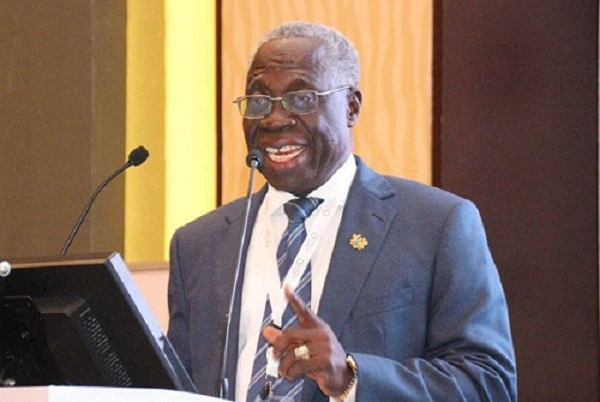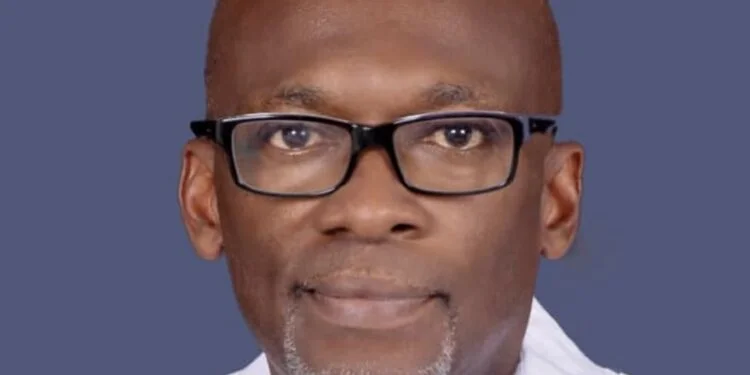There has been yet again another revelation in the ongoing trial of former COCOBOD Chief Executive Dr Stephen Opuni and businessman Seidu Agongo, detailing roles played by the former Senior Minister Yaw Osafo-Maafo to get them prosecuted.
Interestingly, Mr Osafo-Maafo’s niece, Evelyn Keelson, is one of the state attorneys prosecuting the matter with alacrity. He remains integral to the Akufo-Addo government, serving as Senior Presidential Advisor.
The high court, presided over by Justice Aboagye Tandoh on Tuesday, June 11, 2024, heard how Mr Osafo-Maafo convened a meeting in his office to discuss the lithovit liquid fertilizer at the centre of the trial.
Genevieve Baah Mante, Head of the Material Science Department at the Ghana Standard Authority, who was summoned to that meeting held in 2017, has been testifying in the six-year-old criminal trial as a subpoenaed witness of Seidu Agongo.
Dr Opuni and Alhaji Agongo, as well as Agricult Ghana Limited, have been facing 27 charges, including defrauding by false pretences, willfully causing financial loss to the state, corruption by public officers and contravention of the Public Procurement Act in the purchase of Lithovit Liquid Fertilizer between 2014 and 2016.
According to Mr Baah Mante, the meeting, which took place in Osafo-Maafo’s office and delved into two different test results on lithovit liquid fertilizer, had officials from COCOBOD and the Chemistry Department of the University of Ghana in attendance.
“We discussed the results of the two institutions (Ghana Standards Authority and the University of Ghana’s Chemistry Department) and pointed out possible discrepancies in the reports. These included different batch numbers of the same sample supplied to the different institutions.
“The second was the difference in environmental and testing conditions. And the third was the protocol used in testing the samples.
“The fourth was how the sample was sampled (picked). The two institutions requested further testing of the samples.”
Counsel for Mr Agongo, Benson Nutsukpui, then asked the witness, “All these you just told the court took place in Honourable Osafo-Maafo’s office?”
Mrs Genevieve Baah Mante answered in the affirmative, “Yes, my lord”.
It would be recalled that in 2021, it was established that it was Yaw Osafo-Maafo who petitioned the police CID to take over an almost-concluded EOCO investigation into the purchase of lithovit fertilizer by COCOBOD.
Yaw Osafo-Maafo’s involvement in the affairs of COCOBOD in this whole trial was first revealed by the 7th prosecution witness, Chief Inspector Thomas Prempeh Mercer, on Monday, February 15, 2021, when counsel cross-examined the CID investigator for Dr. Opuni, Samuel Codjoe.
Even though EOCO had carried out extensive investigations for about six months, with Dr Opuni reporting to them every week, the CID man said Yaw Osafo-Maafo petitioned the police CID on July 7, 2017, to effectively curtail whatever was being done by an equally competent state agency.
Interestingly, at the time the senior minister signed the “petition,” there was a substantive Minister of Finance with oversight responsibility for activities at COCOBOD until 2020 when that oversight was reassigned to the Agric Minister.
When the investigator was asked about the locus and by what authority Yaw Osafo-Maafo petitioned the police when there was a substantive minister who had oversight on COCOBOD affairs, he replied:
“My Lord, during the transition, investigation of agencies were conducted and on one of this sub committees which did the investigation recommended that investigation should be conducted into the activities of A1 during his tenure as the CEO of Ghana COCOBOD. It is on this basis that the Senior Minister signed this petition.”
There is no gainsaying that Osafo-Maafo’s active involvement in the affairs of COCOBOD culminating in the prosecution has left many people awed, coupled with the fact that his niece, Chief State Attorney Evelyn Keelson, was the one who signed the charge sheet putting Dr Opuni and Mr Agongo in court.
The 2017 meeting in Osafo-Maafo’s office was convened following the test result by the General Chemistry laboratory at the Ghana Standards Authority that confirmed the efficacy of lithovit as a fertilizer. This result by the Authority sharply contrasted with the disputed result from the Chemistry Department of the University of Ghana.
Mrs Baah Mante told the court on Tuesday that she recalled attending another meeting at the office of EOCO, the agency that requested the Authority to conduct the test on lithovit, prior to meeting Osafo-Maafo.
At that meeting, she said, EOCO wanted further clarification of the report it received from the Ghana Standards Authority because the report was at variance with a previous one by the same Authority conducted at the Drugs, Cosmetic and Forensic laboratory that deals with drugs and cosmetics samples as well as medical devices including condoms.
The Head of the Material Science Department of the Ghana Standards Authority, who defended the test result, which is marked exhibit 133, was asked how her office concluded that lithovit liquid fertilizer is a fertilizer.
“The analyst found nitrogen, phosphorus, and potassium which are the primary nutrients for fertilizer. The analyst also found magnesium and calcium, which are secondary nutrients for fertilizer. Iron and zinc are trace elements for fertilizer,” she answered.
Counsel further asked her, “So all that the analyst found, you found consistent with fertilizer?”
The witness maintained, “Yes my Lord”, and explained that her outfit wrote nil at the remarks column on the report because “at the time this report was generated, we did not have a Ghana Standards for fertilizer”.
She had earlier explained that the Material Science Department comes to its conclusion during testing based on national and international standards. She also said that sometimes clients bring in their own specifications, and in that case, it is based on the client’s specifications.
“When you say Ghana Standards, what exactly do you mean? You can explain using any product of your choice,” counsel sought clarification.
She explained, “For example, the Ghana Standards on bottled drinking water describes the characteristics of the product, it will talk about the colour, the kind of nutrients, compound or elements expected in the water which will not harm us…It should be colourless, it should be free flow, it should not contain salt, it should not have any smell.”
The witness was also asked how the Ghana Standards Authority came by the requirements that products are expected to fulfil.
“The Ghana Standards Authority involves all stakeholders in the standards development process made up of academia, research institutions, consumers, manufacturers, and other stakeholders. We only act as a Secretariat to make sure it is comparable with international standards”.
Touching more on her meeting at EOCO, Mrs. Genevieve Baah Mante said she confirmed to them that although the sample was identified as a fertilizer but, no remark was provided for its suitability for cocoa because of the absence of Ghana specifications or Ghana Standards for a fertilizer.
“So your department, looking through the catalogue which you have, what would [you] say of Ghana Standards for cocoa?” counsel Nutsukpui asked the witness.
She reiterated, “There is no standard for cocoa fertilizer”.
Source: theheraldghana.com





